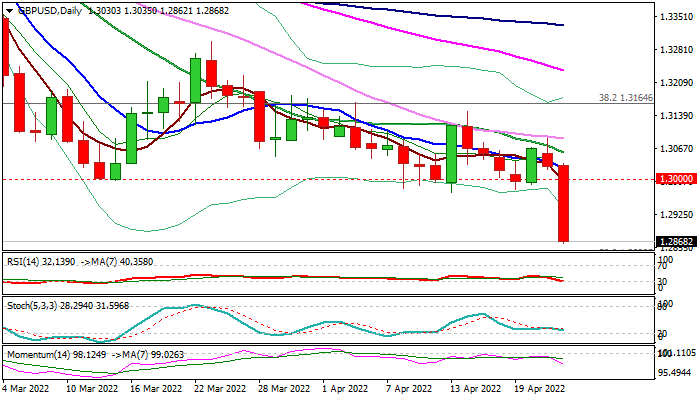British pound slumps as weak UK economic data send strong warning
British retail sales fell sharply and well below expectations in March while consumer confidence dropped near all-time lows, reflecting cost of leaving squeeze and sending a warning signals for the UK economy.
The UK retail sales fell by 1.4% in March after 0.5% drop in February and strongly overshooting forecast for 0.3% drop.
Although retail sales are still above February 2020 levels they are well behind where they would have been if growth had continued at the pace of pre-pandemic trend
Britain’s consumer confidence fell to –38 in April from -31 in March and well below forecasted drop of 33 points, hitting the levels close to record low from 2006.
Falling consumer confidence and retail sales signal that UK households are cutting spending to cope with higher cost of living, on rising prices of food and fuel, with pessimistic outlook as economists expect the crisis to intensify in coming months.
Weak data also add to growing concerns at the Bank of England, which is walking at the edge in attempts of tackling inflation which rose to the highest in three decades and trying to avoid recession that could be a very likely scenario if conditions deteriorate further.
The separate PMI data showed that activities in the UK Services and Manufacturing sectors slowed in April, adding to signals that Britain’s economy is losing steam.
The UK Composite Purchasing Managers’ Index which tracks the activities in both, Services and Manufacturing sectors, fell to 57.6 in April from 60.9 in March and strongly undershot forecast at 59.7.
British pound slumped 1.2% and slid below 1.29 handle, hitting the lowest since November 2020, deflated by weaker than expected economic data and warning that the economy could weaken further, as the impact from the war starts to bite.
Cable eventually broke through psychological 1.30 support, where the pair was stuck for over one month, and accelerated sharply lower.
Fresh drop further weakened the structure, as technical studies on daily and weekly charts remain in full bearish configuration and currently pressure pivotal Fibo support at 1.2829 (50% retracement of 1.1409/1.4249 uptrend), break of which would risk acceleration towards September 2020 trough at 1.2675 and unmask next key level at 1.2494 (Fibo 61.8% of 1.1409/1.4249).
Corrective upticks should remain capped by 1.30 level, reverted to solid resistance, to keep larger bears intact and offer better selling opportunities.



